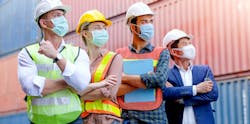Partnerships Forged in Crisis
The COVID-19 pandemic has resulted in the fastest contraction on record for factory activity, while the country’s Purchasing Managers’ Index (PMI) fell to a record low as well. Global supply chains for medical devices, already strained from Hurricane Maria in 2017, have been further disrupted. American industry has been conscripted to build personal protective equipment (PPE), coronavirus test kits, life-saving ventilators and other critical medical devices. Ford, GM, Tesla and other large-scale manufacturers across the spectrum have stepped up and contributed to the national effort.
The world has had to act swiftly, without the time to build new production lines or attempt product development in the traditional way. This is especially challenging when it comes to medical devices, as this space is highly regulated and focused on implementing quality measures for optimal results.
It’s true that the FDA has lowered the regulatory bar during this emergency. The pandemic has required it to become more agile and evaluate risk differently—giving emergency use authorizations to products so they can be brought to market in days, not months. This has been one of the most notable things we’ve witnessed throughout the pandemic: As numerous companies and individuals have stepped up to help with the medical supply shortage, the FDA has been a partner in arming our healthcare professionals with the supplies they need to fight COVID-19.
But products still have to undergo rigorous compliance testing before they are shipped to the front lines. It’s a public safety issue. As large-scale manufacturers in other markets step up to build much needed medical devices, they need to keep these regulatory issues in mind—even as they are under pressure to design, build and ship products as quickly as possible.
To do that, they are partnering. Tesla may not have the specific expertise to navigate the medical device regulatory landscape, but Medtronic certainly does. These two companies have pooled their resources and expertise to build much-needed ventilators. Tesla is providing the additional manufacturing capacity, while Medtronic brings decades of medical device expertise to the table. A third partner acts as a supplier and provides backup capacity when needed.
Experienced medical device manufacturers can provide product design, material selection and material tracking as they relate to FDA compliance. These companies can provide risk mitigation expertise to make sure the device does what is intended and key parts don’t wear down or impact functionality—such as a rough edge puncturing a plasma bag. They can also help choose materials that have already passed medical approval to make sure parts or devices don’t cause allergies and can be sterilized properly. Traceability—where the material came from, who mined or made it and on what day—can also be managed by experienced medical device manufacturers for auditing purposes.
As the third member of the partnership, suppliers are needed for prototyping, testing and backup manufacturing capacity. These companies can provide advice about how a design affects the manufacturing process. For example, perhaps a design is too complicated or costly to scale appropriately. An assembler would have the knowledge to make that call. Suppliers can also provide expertise on materials and manufacturing processes such as whether 3D printing or injection molding would be appropriate.
Supply chains have been disrupted before, and there’s no reason to believe further disruptions aren’t ahead. As the medical industry learned from Hurricane Maria, secondary manufacturing locations are imperative throughout the production lifecycle to mitigate risk for products. Many medical device companies, for instance, made this secondary support a priority for future product development by identifying secondary manufacturing sources for line-down emergencies, or even when they were in need of a bridge-tooling resource. It is critical we continue to build and reinforce our supply chains with the learnings and partnership from these last few months, as industry ramps up in the aftermath of COVID-19.
We’re in an unprecedented chapter in our nation’s history, and manufacturers off all sizes are stepping up to help fill a need for critical medical supplies and devices. In order to meet regulatory standards, partnerships between manufacturers, experienced medical device manufacturers and suppliers should be formed—each providing a vital service and function vital to building medical supplies at the scale needed to defeat COVID-19. Disruption is inevitable, but will we learn and adapt during the journey?
Chris Stevens is a senior research and development engineer at Protolabs.
